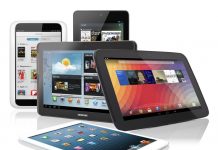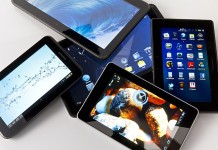 Where the iPhone conquered your pocket, the iPad will conquer your backpack.
Where the iPhone conquered your pocket, the iPad will conquer your backpack.
So says Tim Carmody on the Snarkmarket blog, where he puts down his thoughts about why e-books on the iPad will be more successful than some people think.
Carmody starts with five common reasons skeptics give that e-books won’t take off on the iPad, and notes that most of them aren’t all that new. (Though he does not address the oft-heard complaint that people will not want to read from LCD screens.)
He points out that those who buy the least expensive, 16-gig wifi-only iPad model will, unless they are somewhere with wifi, be limited to what they can carry on the device to read or watch—and 16 gigs will not hold a lot of movies but will hold plenty of e-books. He adds:
(This is actually why I suspect plain-jane, text-only books are going to have a long life as the de facto default for a while. Dedicated reading machines like the Kindle or Nook can’t support anything else, and more versatile portables like the iPad don’t have the built-in memory or everywhere-internet to support a whole library of these things. Add our inertial devotion to document formats like PDF and it may be a very long time before multimedia books or magazines become mainstream items.)
Carmody uses video games as another example of why people might try e-books. He writes that he had never been a mobile video gamer before he bought the iPhone, and indeed bought it mainly as a phone and portable Internet device. But since he already had the device and they were available, he eventually went ahead and bought some iPhone games, too.
And Carmody thinks people will be exactly the same way about e-books on the iPad: they might buy the iPad for surfing the net, watching movies, and playing games, but sooner or later they’ll be in a situation where they need something to read and figure they might as well give it a shot.
This idea is not exactly a new one. In fact, it is probably responsible for the first popular emergence of e-books, back in the ‘90s, as a number of people bought Palm Pilots mainly for use as personal organizers but discovered they were marvelous for reading e-books as well. Of course, it still took over ten years and major e-tailer involvement to kick off a widespread adoption of the format.
As I mentioned above, Carmody does not touch upon the perceived eyestrain factor of LCD screens as opposed to e-ink for reading. I personally think that once people actually have iPads in their hands, they will find it largely a non-issue as long as they remember to adjust the brightness to an appropriate setting for their environment.

































He could very well be right. The new generations of so many devices (IPad, Chromium laptops, netbooks, etc.) assume the user has constant internet access, which is often not the case.
I do believe that HTML (Zipped with graphics), EPub and PDF books could be just as viable a format as plaintext, especially with books that have any image content of even italic or bold formatting.
Oh, silly me. I just went and read the article.
He suggests that Apple wants you to forget your laptop in favor of the IPad. Fat chance if you want to do something like, say, type…or get any real work done…or pull your files off a zip drive…or watch Flash video on the web (HTML5…puh-lease, maybe in a year or eight but not right now.)
So, yeah he’s right that the IPad could be a pretty good ebook platform…but it’s still no substitute for a netbook/laptop
@Bill Smith: But do you want to type or get real work done? I’ve had my laptop on for four hours so far today, and I’ve read a bunch of sites, read newsgroups and email, downloaded a file, listened to web radio, and more, and this comment is the first I’ve done anything that required more than simple clicking. I think a webcentric slate would handle the majority of what most people do most of the time.
By “text-only” I assumed he meant formatted text, such as EPUB, Mobi, eReader, and all the others that use various flavors of text or hypertext in their respective containers, as opposed to the works of multimedia that people are getting all “if you build it they will come” about.
Before I got a decent laptop, I found that I could do 90% of the stuff I would have wanted a laptop to do (email, surf, social network) with my iPod Touch.
@Dhamu: If you want to just read email, no, you don’t need a keyboard. Or type one or two word responses.
But if you want to answer an email, comment on a website…interact with the web instead of being a passive spectator…yeah, you need a keyboard.
Hi, Chris and co. Thanks for the comments. (And a very special thanks to Chris, for correcting my mistake about the minimum capacity of the entry-level iPad. He’s right, it’s 16GB, not 8GB.)
Chris is also right that I do mean formatted text, not “.txt.” And many different formats can do the trick; I’m not trying to argue in favor of PDF over EPUB or anything like that. My point is that the comparatively small size of documents that are primarily text, in whatever format, makes them very suitable to store in large(ish) numbers on a device with a small HD. And really, ALL of the iPads (just like all of the cloudbooks) have small HDs.
I also am not trying to argue that the laptop is going the way of the dodo. Far from it. I do think, however, that as devices like the iPad get more capable, fewer people will stuff their laptops in their bags to use them away from home, whether they’re going to the café or on an airplane or across town to their office. In short, people will use laptops more like desktops (and I think this is already happening.) I think you’ll see many more computer users who have a laptop + iPad, just as in the early days of laptop computing, many people had a desktop as their primary “serious” machine and used their laptop for comparatively light, road-warrior use.
I also agree with Chris — I don’t think eyestrain is really that big of a problem. Not only are LCD screens getting better, but laptops and smartphones are adjusting people’s expectations about how much and how long they can read on these screens. Likewise, I think expectations are shifting about how well folks can type using a software keyboard. I had a terrible time typing on a laptop the first time I tried. Ditto a Blackberry, and especially an iPhone. I do a lot better now, and the iPad will benefit greatly from all of that accidental pre-training.
Again, great discussion! Thanks. Makes me wish I’d caught silly mistakes like the 8GB thing, some typos, and filled in some of my arguments better the first time out!